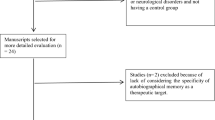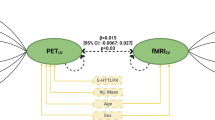Abstract
Background
Depressed patients perform poorly on tests of autobiographical memory specificity (AMS); this may have negative consequences for other important cognitive abilities, delays recovery from mood episodes, and, in recovered patients, may mediate vulnerability to future episodes. Although the cognitive mechanisms underlying AMS deficits are beginning to be understood, the neurobiological mechanisms remain unclear. Serotonin is implicated in both depression and long-term memory; therefore, temporary lowering of brain serotonin function via acute tryptophan depletion (ATD) offers a means of studying the role of serotonin in autobiographical memory specificity.
Materials and methods
In this study, 24 previously depressed women underwent low-dose ATD or sham depletion and completed tests of initial and delayed memory, recollection- and familiarity-based recognition, and AMS.
Results
ATD did not differentially affect state mood. Compared with sham depletion, ATD impaired immediate recall on the Auditory Verbal Learning Test. Although ATD did not differentially impair recollection- and familiarity-based recognition, it did slow recognition of positive words. ATD also reduced autobiographical memory specificity in response to negative cue words.
Discussion
The results confirm previous findings that low-dose ATD can reinstate depression-congruent biases in cognition without causing depressive mood in vulnerable populations. The ATD-induced reduction in memory specificity suggests that serotonergic dysfunction may mediate depressive deficits in autobiographical memory; the interaction of cognitive and neurobiological vulnerability mechanisms is discussed.


Similar content being viewed by others
Notes
Note that we used the mean RT to choose “old” or “new” separated by subsequent judgement type (“remember” or “know”) rather than the time to choose “remember” or “know,” because participants were instructed to make the first choice as quickly and accurately as possible but had as long as they needed to make the second choice.
One participant in each group had a missing RT value because they made no responses of that type; these values were replaced using expectation–maximization within the group.
Collapsed across valence and time of testing, there was no difference in the number of specific memories recalled for the two lists [paired t test: t(22) = 0.577, n.s.]. However, when the data were separated by valence, there were more specific memories recalled for positive cue words on list B than list A [t(22) = 2.44, p = 0.023]; there was no such difference for negative cue words [t(22) = 1.70, n.s.]. When list order was included in the overall mixed design ANOVA testing the effect of ATD on AMS, the only significant effect involving list order was a three-way interaction involving time, valence, and list order [p = 0.033]. There were no other significant effects involving list order, and the crucial time × valence × drink interaction remained significant. Given that there were no interactions involving list order and drink type, we do not believe this detracts from our main results regarding effects of ATD on AMS.
We were not specifically interested in the effect of ATD on NGT; the Number Generation Task was included to examine whether any change in AMS could be attributed to changes in executive function. A 2 (drink) × 2 (time) mixed design ANOVA with Number Generation Task errors as the dependent variable showed no main effects and no interactions [all p values ≥ 0.30]. However, when baseline Number Generation Task errors were introduced as a covariate in the AMS analysis, there was a time × NGT interaction [F(1, 19) = 3.274, p = 0.018], which arose because those who made more errors on the Number Generation Task errors at baseline had a greater decline (or smaller increase) in memory specificity at t5 relative to baseline, independent of drink and cue valence [R (23) = −0.436, p = 0.038]. Crucially, the time × valence × drink interaction for AMS remained significant [p = 0.031], indicating that the decline in memory specificity to negative words following ATD was independent of baseline Number Generation Task errors.
References
Anderson NH (1968) Likeableness ratings of 555 personality-trait words. J Pers Soc Psychol 9:272–279
Barnard PJ, Scott SK, May J (2001) When the central executive lets us down: schemas, attention, and load in a generative working memory task. Memory 9:209–221
Barnard PJ, Watkins ER, Ramponi C (2006) Reducing specificity of autobiographical memory in nonclinical participants: the role of rumination and schematic models. Cogn Emot 20:328–350
Barnhofer T, Kuehn EM, de Jong-Meyer R (2005) Specificity of autobiographical memories and basal cortisol levels in patients with major depression. Psychoneuroendocrinology 30:403–411
Barnhofer T, Crane C, Spinhoven P, Williams JMG (2007) Failures to retrieve specific memories in previously depressed individuals: random errors or content-related? Behav Res Ther 45:1859–1869
Beck AT, Steer RA, Brown GK (1996) Manual for the Beck Depression Inventory—II. Psychological Corporation, San Antonio
Booij L, Van der Does W, Benkelfat C, Bremner JD, Cowen PJ, Fava M, Gillin C, Leyton M, Moore P, Smith KA, Van der Kloot WA (2002) Predictors of mood response to acute tryptophan depletion. A reanalysis. Neuropsychopharmacology 27:852–861
Brittlebank A, Scott J, Williams JMG, Ferrier I (1993) Autobiographical memory in depression: state or trait marker? Br J Psychiatry 162:118–121
Buss C, Wolf OT, Witt J, Hellhammer DH (2004) Autobiographic memory impairment following acute cortisol administration. Psychoneuroendocrinology 29:1093–1096
Conway MA, Pleydell-Pearce CW (2000) The construction of autobiographical memories in the self-memory system. Psychol Rev 107:261–288
Cowen PJ (1996) The serotonin hypothesis: necessary but not sufficient. In: Feighner JP, Boyer WF (eds) Selective serotonin re-uptake inhibitors (perspectives in psychiatry). Wiley, Chichester, pp 63–86
Crane C, Barnhofer T, Visser C, Nightingale H, Williams JM (2007) The effects of analytical and experiential rumination on autobiographical memory specificity in individuals with a history of major depression. Behav Res Ther 45:3077–3087
Dalgleish T, Spinks H, Yiend J, Kuyken W (2001) Autobiographical memory style in seasonal affective disorder and its relationship to future symptom remission. J Abnorm Psychol 110:335–340
Dalgleish T, Williams JMG, Golden AM, Perkins N, Barrett LF, Barnard PJ, Yeung CA, Murphy V, Elward R, Tchanturia K, Watkins E (2007) Reduced specificity of autobiographical memory and depression: the role of executive control. J Exp Psychol Gen 136:23–42
Dayan P, Huys QJ (2008) Serotonin, inhibition, and negative mood. PLoS Comput Biol 4:e4
Delgado PL, Charney DS, Price LH, Aghajanian GK, Landis H, Heninger GR (1990) Serotonin function and the mechanism of antidepressant action. Reversal of antidepressant-induced remission by rapid depletion of plasma tryptophan. Arch Gen Psychiatry 47:411–418
Eldridge LL, Sarfatti S, Knowlton BJ (2002) The effect of testing procedure on remember-know judgments. Psychon Bull Rev 9:139–145
Fernstrom JD, Faller DV, Shabshelowitz H (1975) Acute reduction of brain serotonin and 5-HIAA following food consumption: correlation with the ratio of serum tryptophan to the sum of competing amino acids. J Neural Transm 36:113–121
Gibbs BR, Rude SS (2004) Overgeneral autobiographical memory as depression vulnerability. Cogn Ther Res 28:511–526
Goddard L, Dritschel B, Burton A (1997) Social problem solving and autobiographical memory in non-clinical depression. Br J Clin Psychol 36:449–451
Harmer CJ, Bhagwagar Z, Cowen PJ, Goodwin GM (2002) Acute administration of citalopram facilitates memory consolidation in healthy volunteers. Psychopharmacology (Berl) 163:106–110
Hayward G, Goodwin GM, Cowen PJ, Harmer CJ (2005) Low-dose tryptophan depletion in recovered depressed patients induces changes in cognitive processing without depressive symptoms. Biol Psychiatry 57:517–524
Mackinger HF, Loschin GG, Leibetseder MM (2000) Prediction of postnatal affective changes by autobiographical memories. Eur Psychol 5:52–61
McAllister-Williams RH, Massey AE, Rugg MD (2002) Effects of tryptophan depletion on brain potential correlates of episodic memory retrieval. Psychopharmacology 160:434–442
McNair DM, Lorr M, Droppelman LF (1992) Manual for the Profile of Mood States. Educational and Industrial Testing Service, San Diego
Park SB, Coull JT, McShane RH, Young AH, Sahakian BJ, Robbins TW, Cowen PJ (1994) Tryptophan depletion in normal volunteers produces selective impairments in learning and memory. Neuropharmacology 33:575–588
Peeters F, Wessel I, Merckelbach H, Boon-Vermeeren M (2002) Autobiographical memory specificity and the course of major depressive disorder. Compr Psychiatry 43:344–350
Raes F, Hermans D, Williams JM, Demyttenaere K, Sabbe B, Pieters G, Eelen P (2005) Reduced specificity of autobiographical memory: a mediator between rumination and ineffective social problem-solving in major depression? J Affect Disord 87:331–335
Raes F, Hermans D, Williams JM, Beyers W, Brunfaut E, Eelen P (2006) Reduced autobiographical memory specificity and rumination in predicting the course of depression. J Abnorm Psychol 115:699–704
Ramponi C, Barnard PJ, Nimmo-Smith I (2004) Recollection deficits in dysphoric mood: an effect of schematic models and executive mode? Memory 12:655–670
Raven J, Raven JC, Court JH (1998) Manual for Raven’s Advanced Progressive Matrices. Oxford University Press, New York
Rey A (1964) L’examin de Clinique en psychologie. Presses Universitaires de France, Paris
Riedel WJ, Klaassen T, Deutz NE, van Someren A, van Praag HM (1999) Tryptophan depletion in normal volunteers produces selective impairment in memory consolidation. Psychopharmacology (Berl) 141:362–369
Roiser JP, Levy J, Fromm SJ, Wang H, Hasler G, Sahakian BJ, Drevets WC (2008) The effect of acute tryptophan depletion on the neural correlates of emotional processing in healthy volunteers. Neuropsychopharmacology 33:1992–2006
Ruhe HG, Mason NS, Schene AH (2007) Mood is indirectly related to serotonin, norepinephrine and dopamine levels in humans: a meta-analysis of monoamine depletion studies. Mol Psychiatry 12:331–359
Sambeth A, Blokland A, Harmer CJ, Kilkens TO, Nathan PJ, Porter RJ, Schmitt JA, Scholtissen B, Sobczak S, Young AH, Riedel WJ (2007) Sex differences in the effect of acute tryptophan depletion on declarative episodic memory: a pooled analysis of nine studies. Neurosci Biobehav Rev 31:516–529
Smith KA, Fairburn CG, Cowen PJ (1997) Relapse of depression after rapid depletion of tryptophan. Lancet 349:915–919
Spinhoven P, Bockting CLH, Schene AH, Koeter MWJ, Wekking EM, Williams JMG (2006) Autobiographical memory in the euthymic phase of recurrent depression. J Abnorm Psychol 115:590–600
Tulving E (1985) Memory and consciousness. Can Psychol 26:1–12
van Minnen A, Wessel I, Verhaak C, Smeenk J (2005) The relationship between autobiographical memory specificity and depressed mood following a stressful life event: a prospective study. Br J Clin Psychol 44:405–415
Williams JMG (1996) Depression and the specificity of autobiographical memory. In: Rubin DC (ed) Remembering our past: studies in autobiographical memory. Cambridge University Press, Cambridge, pp 244–270
Williams JMG, Ellis NC, Tyers C, Healy H, Rose GS, MacLeod AK (1996) The specificity of autobiographical memory and imageability of the future. Mem Cognit 24:116–125
Williams JMG, Teasdale JD, Segal ZV, Soulsby J (2000) Mindfulness-based cognitive therapy reduces overgeneral autobiographical memory in formerly depressed patients. J Abnorm Psychol 109:150–155
Williams JMG, Barnhofer T, Crane C, Hermans D, Raes F, Watkins E, Dalgleish T (2007) Autobiographical memory specificity and emotional disorder. Psychol Bull 133:122–148
Yanes PK, Roberts JE, Carlos EL (2008) Does overgeneral autobiographical memory result from poor memory for task instructions? Memory 16:669–677
Acknowledgments
This study was funded by a Wellcome Trust Program grant to JMGW (GR067797). ADMH was supported by an Overseas Research Student Award from Universities UK and a Clarendon Scholarship. We thank Martina di Simplicio, Michael Browning, and Matthew Taylor for their clinical support and Abbie Pringle, Kamilla Miskowiak, and Mike Franklin for technical assistance with the study.
Statement of interests
CJH has acted as a paid consultant for Lundbeck, Servier, and Merck, Sharpe and Dohme and is a shareholder in P1vital. The other authors have no relevant interests.
Author information
Authors and Affiliations
Corresponding author
Rights and permissions
About this article
Cite this article
Haddad, A.D.M., Williams, J.M.G., McTavish, S.F.B. et al. Low-dose tryptophan depletion in recovered depressed women induces impairments in autobiographical memory specificity. Psychopharmacology 207, 499–508 (2009). https://doi.org/10.1007/s00213-009-1693-2
Received:
Accepted:
Published:
Issue Date:
DOI: https://doi.org/10.1007/s00213-009-1693-2




